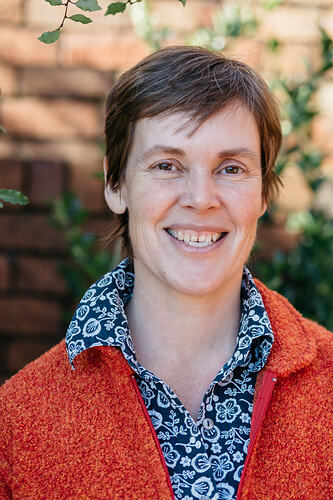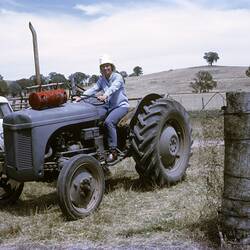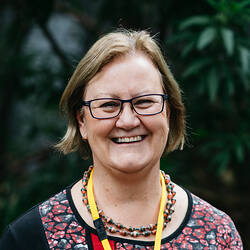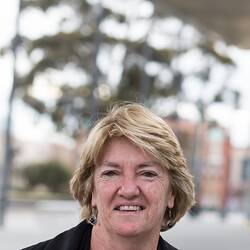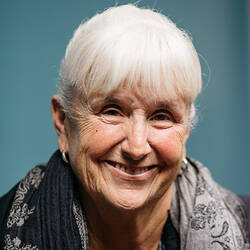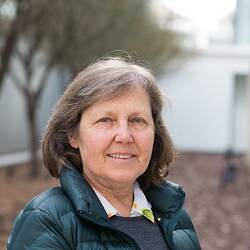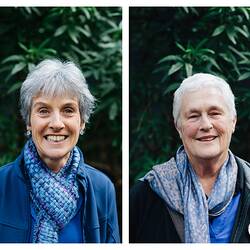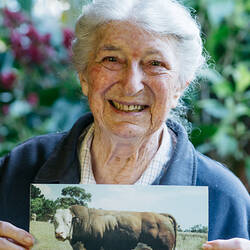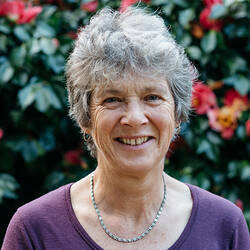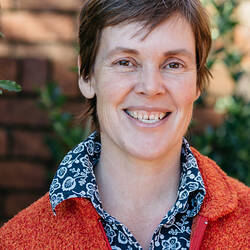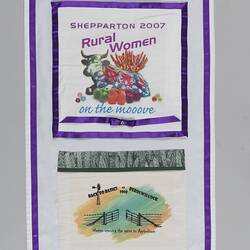Rosemary Grant studied agricultural science at the University of Tasmania in the 1970s and became a journalist with ABC radio upon graduating. She moved to Victoria and worked for the ABC in rural Victoria, which is when she started to get involved in the Rural Women's Movement. Rosemary was on the committee of the 1994 International Women in Agriculture Conference, which was a significant event in the history of the Rural Women's Movement. ABC radio has intersected with the Rural Women's Movement in a number of ways, and particularly through the creation of the ABC Rural Women of the Year Awards in the early 1990s. Rosemary's 27 year career with ABC rural radio provides a unique insight into this period in Australia's history, and highlights the importance of journalism and the media in raising the profile of rural women.
The following excerpts were taken from an interview with Rosemary Grant for the Invisible Farmer Project recorded by Curator Catherine Forge in Launceston, Tasmania, on 3 August 2015.
How did you get involved with agriculture?
So I didn't grow up on a farm but both of my parents did and I grew up on the north-west coast of Tasmania, born in Launceston and lived in Burnie, right in the middle of the town. My dad was a school teacher and my mum was a nurse and they obviously had those country connections. I had cousins on both sides of the family, an extensive family network, so I remember from an early age doing the things that kids do which is running around outside on other people's farms while mum and dad were on the verandah or inside at the kitchen having a cup of tea. When I was about seventeen my brother went off with a friend of his who was studying Agricultural Science that summer to work at an Agricultural Research Station at Tewksbury and so we'd get letters from my brother Ron about their farming adventures and it was about moving irrigation pipes and generally being young lads. I was aware of those boys that were all studying Agricultural Science so I was looking at all the things that you could do, and it didn't seem like it was on anyone's agenda or radar that I might be interested in doing Agriculture, but that's what I ended up doing.
Can we talk about the pathway that led you to study agriculture?
It was really accidental, in the sense that there wasn't a pathway - it was more a matter of eliminating things. I think probably the critical thing was that by the time I got to high school you could do Science, and I remember seeing these posters from the second wave of feminism with overall wearing women and slogans such as 'girls can do anything.' That was the message that was coming through, and it was being overtly stated, and it was a message that was reinforced from the earliest times. So I thought I could probably enjoy doing Agricultural Science, and I just thought 'oh yeah, well girls can do anything', you know. It was also a process of eliminating things. I didn't want an office job and I didn't want to work in a hospital, and although I didn't even know what sort of Agricultural Scientist I wanted to be - or even if I would be an Agricultural Scientist - I thought it was still going to be broad enough to give me choices at the end. And that turned out to be the case.
Can you tell us about your experience of studying Agricultural Science?
It was a really broad education, so to start with the first year was Physics and Chemistry. We were kind of in with mostly the Science students, so there was not very much differentiation. It was Zoology and Botany, Physics, Chemistry, and this one excursion a week out to look at farms, and things that related to Agriculture in the broadest sense. In summertime another requirement of the course was that we completed a number of weeks of practical work. So it needed to be a certain type of endorsed employment, and I remember doing some jobs and finding the men that I worked with were incredibly avuncular. I don't know if that tells you anything at all. I was a young female who had no experience, so I didn't mind that people would kind of take this slightly patronising attitude, but nevertheless I think it was different treatment than probably most of the boys would have got.
How did you get involved with the Rural Women's Movement of the 1980s-1990s?
Well, I graduated in 1985 but before I graduated I got a job as an Agricultural Scientist - a short term job - with the Department of Primary Industry in Hobart. I was based in at the Newtown Labs and it was a junior position, looking after bits of other people's scientific trials in the area called 'Fruits and Ornamentals.' So I did that job, but I always had in the back of my mind that it was time to go and see the world, because growing up in a small place like Tasmania you get hungry for other places and other things that you haven't experienced. So, in the middle of 1986, I caught a boat from Devonport to Melbourne, and then I caught a train from Melbourne to Sydney. I stopped in Sydney and within the first week I got a job with the Bureau of Statistics, and that was actually working on the 1985 or 1986 census. There was a question about how many farmers were women, as opposed to being 'farmer's wives.' Sometimes the woman would answer 'farmer' and other times 'farmer's wife', and we had to try to put them into a category, and it turned out it was completely arbitrary. So if anyone looks at those survey results and comes to some sort of conclusion, it was just that we put some in this pile and we'd put some in that pile, having debated and discussed whether there was a distinction between a farmer whose occupation and jobs were almost entirely in the very domestic sphere, in doing the books or moving the livestock, or doing everything or anything.
How did you get involved with ABC radio and rural reporting?
While I was doing that job with the census in Sydney I got a phone call from the ABC because before I'd left Tasmania I'd applied for a traineeship as a rural reporter and I had always - since my teens - valued the radio as a means of communication. So I started listening to Radio National, and got the value of listening to the radio, and it dawned on me that it might be possible to become a rural reporter. So anyhow, I got this job with ABC radio, and I found myself posted to the far south coast of New South Wales as a trainee rural reporter, not knowing anything about how to be a rural reporter. And for the first time I had the opportunity to put myself in a public position and see how I was judged as a woman in agriculture, as a rural reporter speaking in public. I went to the Bega Hoof and Hook carcass competition and got there early on the Saturday. I didn't have a story for the Monday, so I knew I absolutely had to have an interview from this event. I didn't know enough about who was who, or what was what, and it was a struggle. So I sat up in the showground and the showground stand filled up and I could hear the women down below talking about the new rural reporter, and about how awful they were! So that was my very first kind of experience of being judged publically and being known and it was a town where there were very few people my age. If I crossed the road people would look and you know, there was no hiding out, it was quite a small community in those days. I would almost always find myself at meetings and I would be the only woman there. I recall there was a meeting at the Bega RSL and that was my introduction to the fact that the Bega RSL - the New South Wales Farmers Association meeting - had a gymnasium and on the door of the gymnasium it said, 'women can use this facility between 2 and 4 on a Sunday afternoon.'
Can you elaborate on your experience of gender and rural life?
I had a whole series of experiences that left me with a series of questions about gender. So here I was, starting to get a framework for how life operated and probably a little bit about the sorts of reservations some people had said to me about, 'won't that be hard for you being a woman and studying Agriculture'? I spent a year presenting the Country Hour in Tasmania and saw some behavior in that workplace that had me wondering very much about - not necessarily about men or organisations' treatment - but about women's characterisation of their own roles and how they regard other women. After about twelve months I took up a job in Shepparton and as I was driving along and listening to the radio I heard about a Women's Studies summer school at Deakin University in Victoria. I had a great boss and rang him up and said 'look, I know it's really short notice but could I have next week for holidays as there's something I really, really want to do', and he said yes. So, I packed the panel van up and drove from Shepparton to Geelong and found myself at the Deakin Women's Studies Summer School a whole who's who of seriously academic and activist feminists, who I'd never met. I came out of that with some sense of a framework to hold those questions and contradictions that I'd been thinking about.
You got involved with the Rural Women's Movement of the 1980s-1990s. What were some of the major issues at the time?
Well, it comes down to a little bit to this term of your project, which is called the Invisible Farmer. Fundamentally, in many ways, we were a group of women who could see something was missing but at that stage most of us didn't have very much language to articulate it. One of the things that was pretty clear to me that was missing was women's contribution. It was just shocking to me that you'd go to meetings of the men's kind and the only woman who'd be there would be taking the minutes. In other words, recording the men's stories. We talk about the Australian bush and it's stereotypically this masculine bush, but I'd grown up in a Tasmanian bush and my grandmother was a pioneering farm woman. She really was, she really lived it. There were always women there, but we didn't have much language to communicate the lived experience of rural women.
What was your own personal experience of the Rural Women's Movement?
I had starting working in Shepparton and there was a drought in Victoria. That community had been doing it quite tough. There were some really difficult outcomes on a lot of farms. With the drought had come soil salinisation problems and lower levels of production, and there was a group of women who got together because they were concerned about people's welfare fundamentally and so they called themselves 'Friendly Ears.' I found myself with that local group of women and they were talking about what could make a difference in that community, so it was through those connections then that I was invited to participate in a number of networking initiatives, including the Numurkah Women on Farms Gathering in 1992. In the lead up to that Gathering we had to decide how to articulate things, what language we'd use, where would men fit in the scheme of things, how would you deal with not having men being alienated? Who would we choose as guest speakers? And so we were working through all of these things. The event was held and I was able to report on it through my position at ABC, and it was transformational. People were thrilled. They were thrilled with the fact that there was a possibility for them being women and farmers, not just invisible farmers.
Do you recall the First International Women in Agriculture Conference that was held in 1994?
Yes, I was on the steering committee for that conference, there were about a dozen of us I think, and Mary Salce - a dairy farmer from Gippsland - was the Chairwoman. In the end we had a thousand and thirty women registered and there was a huge fundraising job to be done. There was legitimacy to be created, you know, credibility, both here and overseas. I was always gobsmacked when Mary and somebody else who had that credibility as an active rural farming woman would go to one of the big firms in Melbourne and organise a meeting with somebody who was really senior, if not the top person, and they'd come back and say 'oh we've secured you know ten thousand dollars sponsorship from the Wheat Board' or something like that. And then there was the day when it was confirmed that the Governor General was going to open the Conference, and politicians of all persuasions had seen it as something that was valid and legitimate to come to. There was a huge amount of detail that had to be organised, critical things like time and place and venue, invitations to people overseas, organising scholarships for women in developing countries - a complex program.
What did the conference achieve?
One of the things that seemed really critical to me was to get that global perspective - meeting women from a number of African nations, parts of the Pacific, parts of Asia, from the Americas and UK and Ireland and Europe. There were over twenty countries represented, and you start to realise how important this is for food security. We really started to grasp how important this is for rural development on a global sense, and how important it was for rural women to have opportunities I reckon by the end of that decade there was vast amount more opportunity, there were scholarships for women, there was changed Agricultural curriculum, there were books that had been published reflecting woman's stories, not just men's stories. There were new roles created within government departments, there were newsletters, there were seminars just for women where you could go and do something and it could have been something that was traditionally female or something a little bit traditionally male. There were also things where men found themselves able to ask to be invited to things that had traditionally been considered women's business, so you know, it might have been something that had more to do with children or education, or something in the domestic sphere.
Reflecting on your 27 year career with ABC radio, what role has the media played in the wider Rural Women's Movement?
When I joined the ABC, the ABC had an affirmative action policy and they were sending female rural reporters out into the field. The numbers that they were hiring were about 50/50 in those days and the ABC had an affirmative action policy which was about gender neutral language. In terms of employment, you had to be able to demonstrate that you were being an equal opportunity employer. In the 1990s, for instance, a woman called Lucy Broad became the first national Rural Editor of the ABC and a woman named Lisa Palu started up a local Rural Woman of the Year competition for her district. Queensland decided to make this competition Queensland-wide and then ABC decided that they would have this right across the ABC, so this was something that came through from Lucy Broad. In 1993 ABC they had the first National Award made at the Great Hall of the National Gallery in Victoria at that first International Rural Women's Conference in 1994, and then every year subsequently. So, that was quite catalytic. That was a real conversation changer, you know, in the lead up the ABC reporters would go out and run interviews with their local finalists, and then their local finalists would get through to the state and we'd hear from them. That's something that's been going since 1994, so twenty-one years, the ABC is still actively involved in that. Just personally, I'd still like to hear more rural women's voices on the radio.
More Information
-
Keywords
Agriculture, Farming, Rural Women, Rural Industry, Rural Victoria, Women's Associations, Conservation, Sustainable Agriculture, Women's Movement, Gender Roles
-
Localities
-
Authors
-
Contributors
-
Article types
